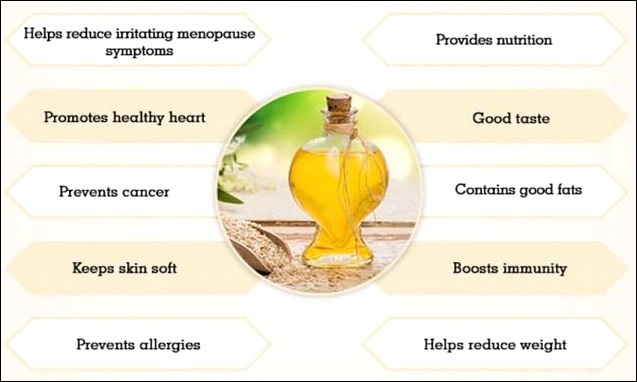
The health benefits of rice are such that it helps in providing energy, prevents obesity, controls blood pressure, prevents cancer, eating white rice benefits for skin and prevents Alzheimer's disease, has Diuretic & Digestive Qualities, improves metabolism. Eating rice can boost cardiovascular health, it relieves the symptoms of Irritable Bowel Syndrome, prevents chronic constipation and regulates body temperature.

Rice is the seed of the grass species Oryza sativa (Asian rice) or Oryza glaberrima (African rice). As a cereal grain, it is the most widely consumed staple food for a large part of the world's human population, especially in Asia. It is the agricultural commodity with the third-highest worldwide production, after sugarcane and maize. Rice is the most important grain with regard to human nutrition and caloric intake, providing more than one-fifth of the calories consumed worldwide by humans.
Rice, a monocot, is normally grown as an annual plant, although in tropical areas it can survive as a perennial crop and can produce a ration crop for up to 30 years. Rice cultivation is well-suited to countries and regions with low labor costs and high rainfall, as it is labor-intensive to cultivate and requires ample water.
Differetn types of rice are cultivated in different counties, some common rice is White, Black rice, Jasmine rice, Brown rice, Red cargo rice, Parboiled rice and each one offers different health benefits.
Rice is abundant in carbohydrates and it provides enough energy to the body and aids in the normal functioning of the brain. Carbohydrates require to be metabolized by the body and be turned into functional, usable energy. The vitamins, minerals, and various organic components present in rice increase the functioning and metabolic activity of all organ systems in the body, which further increases energy levels. White and brown rice are good sources of energy, even you can create rice ball and add with different dishes that suit your taste buds and health. Even you can consume rice water, which is a good source of energy.

Consumption of rice is extremely beneficial for health, simply because it does not contain harmful fats, cholesterol or sodium. It forms an integral part of balanced diet. The low levels of fat, cholesterol, and sodium present in rice also helps to reduce obesity and the health conditions associated with being overweight.
Rice is low in sodium, so it is considered one of the best foods for those suffering from high blood pressure and hypertension. Sodium can cause veins and arteries to constrict, increasing the stress and strain on the cardiovascular system as the blood pressure increases. This is also associated with heart conditions like atherosclerosis, heart attacks, and strokes, so avoiding excess sodium is always a healthy solution. Brown rice and whiter rice are good for high blood pressure patients, Red yeast rice for blood pressure also consumed by people to control blood pressure.
Rice is rich in insoluble fibre that protects against many types of cancer. Many scientists and researchers believe that such insoluble fibres present in rice are vital for protecting the body against the development and metastasis of cancerous cells. Fibre is specifically beneficial in defending against colorectal and intestinal cancer.
However, besides fibre, rice also has natural antioxidants like vitamin C, vitamin-A, phenolic and flavonoid compounds, which also act as or stimulate antioxidants to scour the body for free radicals. Free radicals are by-products of cellular metabolism that can do serious damage to organ systems and cause the mutation of healthy cells into cancerous ones. In such cases, rice helps in boosting antioxidant levels within the body.
Black rice, brown rice, rice bran oil, and rice water also used in skin care treatments. Medical experts say that rice powder can be applied topically to cure some skin ailments. In India, rice water is readily prescribed by ayurvedic practitioners as an effective ointment to cool off inflamed skin surfaces. The phenolic compounds that are found in it, particularly in rice, have anti-inflammatory properties, so they are also good for soothing irritation and redness.
Whether consumed or topically applied, a substance derived from rice tends to relieve a number of skin conditions. The antioxidant present in rice capacity also helps delay the appearance of wrinkles and other premature signs of aging that can affect the skin.
The husk part of rice is considered to be an effective medicine to treat dysentery, and a three-month-old rice plant's husks are said to have diuretic properties. Chinese people believe that rice considerably increases appetite, cures stomach ailments and treats all digestive problems.
As a diuretic, rice husk can help to lose excess water weight, eliminate toxins from the body like uric acid, and even lose weight, since approximately 4% of urine is actually made up of body fat. The high fibre content of rice also helps in increasing bowel movement regularity.
Rice is an excellent source of vitamins and minerals like niacin, vitamin D, calcium, fibre, iron, thiamine and riboflavin. These vitamins present in rice provide the foundation for body metabolism, immune system health, and general functioning of the organ systems, since vitamins are commonly consumed in the most essential activities in the body.
Rice bran oil extracted from the husk of rice is known to have antioxidant properties that promote cardiovascular strength by reducing cholesterol levels in the body. The husk of the grain is where much of the nutrients reside and this is removed in white rice preparation.
Rice is rich in resistant starch, which reaches the bowels in an undigested form. This type of starch stimulates the growth of useful bacteria that help in normal bowel movements. Also, this insoluble rice is very useful in reducing the effects of conditions like Irritable Bowel Syndrome (IBS) and diarrhoea. You can consume White rice or brown rice for irritable bowel syndrome.
Rice can also prevent chronic constipation. The insoluble fibre from rice acts like a soft sponge that may be pushed through the intestinal tract quickly and easily. Rice, which are whole grains are known to be rich in insoluble fibre. However, it is advisable to drink lots of water for relieving one's constipated condition, in addition to eating fibrous foods.
Rice contains high levels of nutrients that stimulate the growth and activity of neurotransmitters, subsequently helping to prevent Alzheimer's disease to a considerable extent. Various species of rice have been found to stimulate neuroprotective enzymes in the brain, which inhibit the effects of free radicals and other dangerous toxins that can cause dementia and Alzheimer's disease.
While cooking rice, the water in which it is boiled is known as rice water. The presence of rice water is linked to high-temperature rice which provides starch in the water. Rice water is able to regulate body temperature. Consumption of rice water is thus a way to heal fever as well as it regulates body temperature. Hence rice an aid to help people having a fever.
Rice is just not used as a staple for consumption. In addition to this, there are many other surprising uses of rice. Rice is used to dry out water damaged electronics, create a rice hot/cold pack, prevents salt clumps, helps in testing oil temperature before frying things, sharpens blender blades, used for cleaning dirty vase, helps to ripe fruits faster, prevents the formation of rust. It is also used as a beauty product to make one's skin glow.
